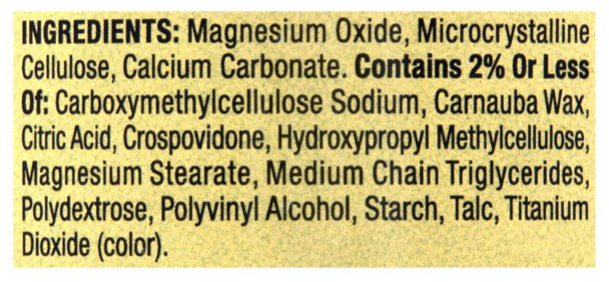Magnesium is a little-discussed mineral. But what most people are not aware of is that magnesium plays an essential role in the formation and maintenance of normal bone structure in our body and a host of other functions. Does magnesium help digestion? Let’s discuss it in more detail.
Magnesium is the 4th most abundant mineral in your body. Every cell in our body contains some magnesium ions. In the human body, 60% of the magnesium is found in the skeleton, 39% in the muscles, and 1% are extracellular.
Origins Of Magnesium

It was first believed that magnesium and calcium were the same substance. However, in 1755, a Scottish chemist named Joseph Black was able to prove that the two were different. He reported that, based on his experiments, “magnesia alba is a compound of a peculiar earth and fixed air.”
Later on, Sir Humphrey Davy was the first to isolate magnesium in London, England in 1808. He passed electricity through salts by using a large battery. By doing this, he found out that he was able to isolate several alkali and alkali earth metals. He called this new metal ‘magnesium’ after magnesia which he used in his experiments. The name was also derived from Magnesia, a district of Thessaly in Greece, where magnesia alba or calcium oxide was first found.
Nutrition Facts of Magnesium

But how about the nutritional value of magnesium? Nowadays, magnesium is safe for consumption and widely available. For men, the recommended daily intake of magnesium is 400 to 420 mg per day, while women should take 310 to 320 mg per day.

The food you eat can provide the necessary amount of magnesium that you need daily. However, those who have a higher risk for deficiency or do not get enough of the mineral through their diet must take magnesium supplements. Here are the ingredients of a 400 mg bottle of Spring Valley Extra Strength Magnesium supplement which provides 95% of the recommended daily value per tablet.
Types Of Magnesium Supplements
There are different types of magnesium supplements with different uses and rates of absorption, and here are some of the most common ones:
- Magnesium oxide
- Magnesium citrate
- Magnesium gluconate
- Magnesium chloride
- Magnesium aspartate
- Magnesium hydroxide
- Magnesium glycinate
- Magnesium sulfate
Does Magnesium Help Digestion?

Magnesium plays a critical role in the performance of more than 300 metabolic reactions vital for optimal health. Some of these are blood pressure regulation, muscle contraction, nerve signal transmission, and energy production. In short, an extreme lack of magnesium can turn your body out of whack.
Magnesium also helps promote gut health, which pertains to 2 facets of a healthy gastrointestinal tract. The first is the ‘gut microbiome’ which is a huge amount of beneficial bacteria that reside in our GI tract. The second refers to digestive health which includes better digestion as our stomach contains enzymes that help to break down food into nutrients and waste.
So how does magnesium affect digestion? Here are some of the ways:
-
Magnesium helps protect the gut microbiome.
There are around 40 trillion beneficial bacteria contained along the length of the intestinal tract. When this gut microflora gets out of balance, it may give rise to a host of autoimmune diseases such as Crohn’s disease, characterized by chronic bowel inflammation.
One study revealed that magnesium deficiency can alter the gut microflora and may even lead to depressive behavior.
-
Magnesium helps fight digestive diseases.
As mentioned earlier, magnesium is essential to more than 300 biochemical processes of the body. Some of these processes are needed to break down food that enters the gut during digestion.
This indicates that low magnesium levels may cause new digestive issues to develop or aggravate already existing digestive disorders.
-
Magnesium helps treat dyspepsia.
Dyspepsia is the more complicated term for indigestion. Magnesium acts as an antacid that minimizes symptoms of heartburn and indigestion which include gas, belching, abdominal pain, bloating, nausea and vomiting.
Among several magnesium compounds that can help treat indigestion, the one that works the fastest seems to be magnesium hydroxide.
-
Magnesium helps treat constipation.
Magnesium serves as a laxative because it draws water into the intestines and stimulates bowel motility. It also softens the stool enabling it to pass through the intestines smoothly which aids in the treatment of those suffering from constipation.
Magnesium hydroxide, magnesium sulfate, and magnesium citrate, which is the most easily absorbed in the digestive tract among the other forms, are used to treat constipation.
In addition, magnesium helps neutralize stomach acids and assists in getting the body ready for medical procedures.
What Happens When You Have Magnesium Deficiency?

Unfortunately, new evidence confirms that almost 75% of the Western population are short of the recommended daily allowance for magnesium which can lead to the development of various health conditions.
When you have low magnesium intake or have poor absorption of this mineral, you can experience symptoms of magnesium deficiency such as:
- Poor sleep
- Fatigue and muscle weakness
- Migraines
- Irregular heartbeat
- Eye twitches
- Muscle cramps or spasms
- Mood disorders
- Hypertension
- Asthma
- Skin problems
You may also be at higher risk for osteoporosis, heart disease, stroke, diabetes, and metabolic syndrome.
To counter this, you need to consume more magnesium which can be found in foods such as:
- Leafy green vegetables, especially broccoli and spinach
- Legumes
- Nuts, especially almonds, cashews, hazelnuts, and peanuts
- Whole grains, especially wheat and oat bran
- Seeds, especially flaxseeds, chia seeds, and sunflower seeds
- Potato
- Fish, especially salmon and halibut
- Avocado
- Black beans
- Peanut butter
Generally, fiber-rich foods are high in magnesium. You can also get magnesium from fortified foods like breakfast cereals and other processed foods, dairy products, meats, coffee, dark chocolate, and even tap or bottled water with high mineral content.
Sum And Substance

Magnesium is an important mineral that you need to keep healthy. It plays a vital role in many body functions such as protein synthesis and energy metabolism. It also helps in maintaining optimal bone health, muscle activity, and nerve, brain, and heart function.
When you get a sufficient amount of this essential nutrient from natural foods, fortified foods, and supplements, you can have your blood sugar regulated, improve sleep, and get relief from constipation, among other things. So does magnesium help digestion? Most certainly yes!

